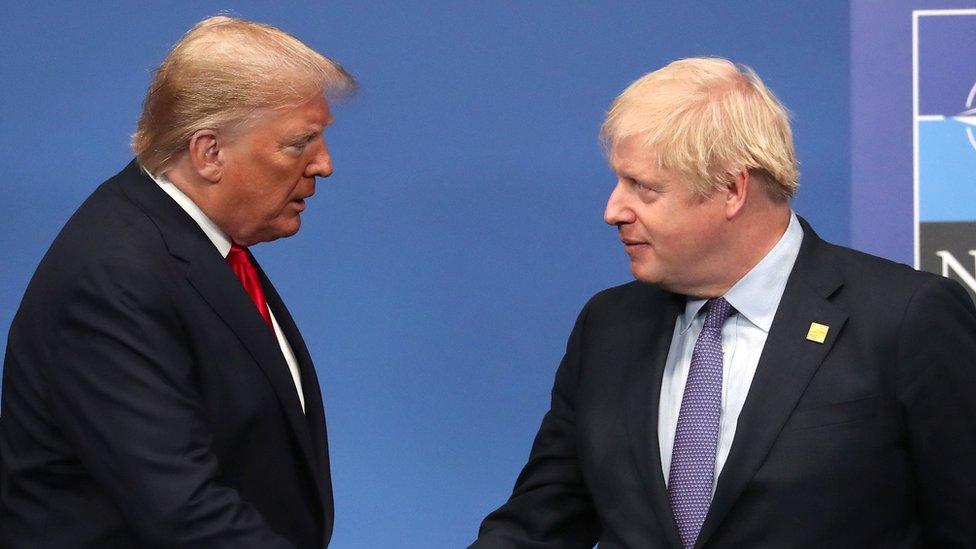Qasem Soleimani: Boris Johnson not told about US airstrike
- Published

Boris Johnson was not warned about the US airstrike in Iraq that killed a top Iranian general, the BBC understands.
The UK has 400 troops based in the Middle East and works alongside US forces in the region.
But President Donald Trump did not tell the UK PM about the attack he ordered that killed Qasem Soleimani on Friday.
Labour leader Jeremy Corbyn has asked Mr Johnson to confirm what the UK was told before the airstrike.
In a letter to the prime minister, he asked whether, if it had been informed in advance, the government had expressed its opposition to the attack.
He also requested an urgent meeting of the privy council to discuss the airstrike's consequences, and asked what the government was doing to ensure the safety of UK nationals.
Meanwhile Tory MP Tom Tugendhat said there was a "pattern" from the current White House not to share details with its allies, which was a "matter of concern".
The former chairman of the Commons Foreign Affairs Committee added: "I have long believed the purpose of having allies is so we can surprise our enemies, not each other."
The death of Gen Soleimani "will certainly be a huge blow to the Iranian regime", but will "doubtless have consequences" elsewhere, Mr Tugendhat told BBC News.
Foreign Secretary Dominic Raab did speak to US Secretary of State Mike Pompeo on Friday, although the time of the call is not known.
'Aggressive threat'
Mr Pompeo tweeted, external that he was "thankful that our allies recognise the continuing aggressive threats posed by the Iranian Quds Force".
Mr Raab also issued a statement, urging "all parties to de-escalate" after the killing of Gen Soleimani.
He said the UK "recognised the aggressive threat" Gen Soleimani posed, but "further conflict is in none of our interests".
The Foreign and Commonwealth Office, external has warned British nationals to avoid any rallies, marches, or processions in Iran over the three days of national mourning the country has called for Gen Soleimani.
As well as troops, there are around 400 British personnel based in Iraq - where the strike took place.
The troops are there to train Iraqi forces tackling an Islamic State insurgency.
BBC security correspondent Frank Gardner earlier said he did not think anyone in the UK was given an indication the air strike was going to take place, adding: "My sense is this has caught the British government largely by surprise."
The killing of Gen Soleimani marks a major escalation in tensions between Washington and Tehran.
Iran's Supreme Leader Ayatollah Ali Khamenei said "severe revenge awaits the criminals" behind the attack, but a statement from the Pentagon said Gen Soleimani "was actively developing plans to attack American diplomats and service members in Iraq and throughout the region".
'Closer to the brink'
Labour leader Jeremy Corbyn said earlier that the "US assassination" was an "extremely serious and dangerous escalation".
Mr Corbyn said the UK "should urge restraint" from both Iran and the US - and called for the government to "stand up to the belligerent actions and rhetoric coming from the United States".
He added: "All countries in the region and beyond should seek to ratchet down the tensions to avoid deepening conflict, which can only bring further misery to the region, 17 years on from the disastrous invasion of Iraq."
The acting leader of the Liberal Democrats, Sir Ed Davey, said Iran was governed by "a brutal regime", but accused President Trump of "yet again radically and recklessly escalated tensions in an area where peace-keeping was already on a knife edge".
He called for an immediate statement from Boris Johnson about the UK's position, adding: "The UK should not automatically follow whatever position the Trump administration takes, but work with a broader group of concerned states at the United Nations."
Other UK MPs have been reacting to the incident on Twitter.
Labour's shadow foreign secretary Emily Thornberry said: "For two years, I've warned about Trump's reckless lurch towards war with Iran. Last night's attack takes us even closer to the brink.
"Those of us who marched against the Iraq War must be ready to march again, and ensure we are not dragged into this morass."
Green Party MP Caroline Lucas called for the UK government to condemn the killing and "work with colleagues in the US to counter Trump's reckless and dangerous foreign policy".
And the deputy leader of Northern Ireland's Alliance Party, Stephen Farry, said it was "time for cooler heads".